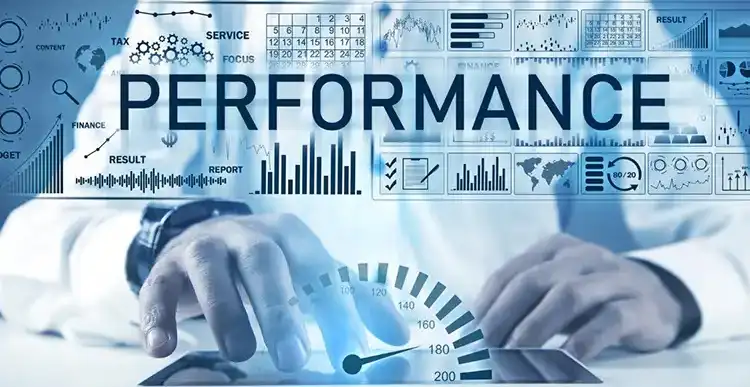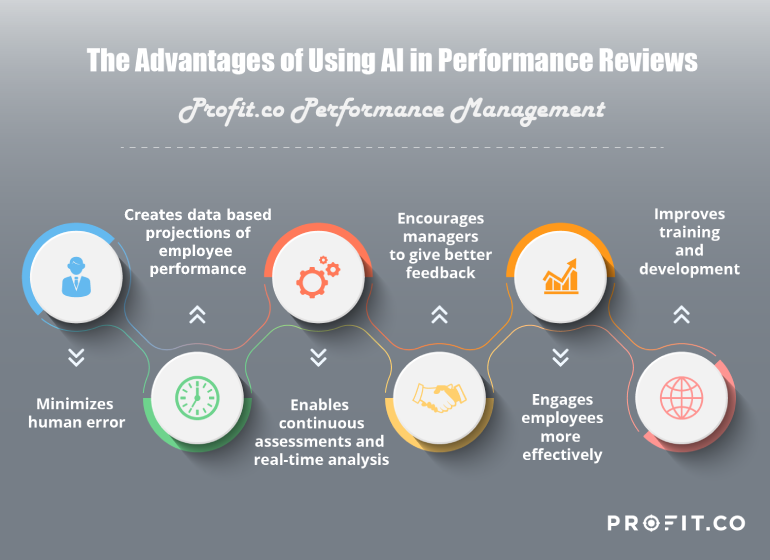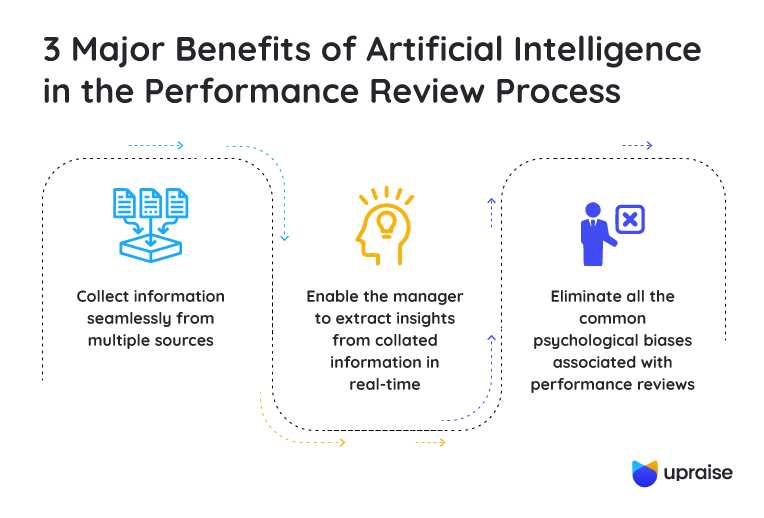
Performance management is a crucial aspect of any organization, as it helps evaluate and improve employee productivity and effectiveness. In today’s digital age, the integration of artificial intelligence (AI) into performance management systems has revolutionized the way businesses approach this process. AI-driven performance management systems offer a wide array of benefits that can significantly enhance an organization’s overall performance. Let’s explore the advantages of incorporating AI into performance management systems and how it can drive success in the modern workplace.
One of the key benefits of AI-driven performance management systems is their ability to provide real-time feedback and insights. Unlike traditional methods that rely on manual evaluations and periodic reviews, AI systems can continuously monitor and analyze employee performance. This means that employees receive immediate feedback on their strengths and areas for improvement, allowing them to make timely adjustments and optimize their performance. Additionally, AI systems can detect patterns and trends in employee performance data, enabling managers to identify opportunities for growth and development within their teams. By leveraging AI-powered performance management systems, organizations can foster a culture of continuous improvement and ensure that employees are constantly aligned with their goals and objectives.
AI-driven Performance Management Systems offer a range of benefits for businesses. These systems leverage artificial intelligence to automate and streamline performance evaluation processes. By using AI algorithms, organizations can gain valuable insights into employee performance, identify areas for improvement, and make data-driven decisions. Moreover, AI-driven systems can provide real-time feedback, personalized development plans, and predictive analytics to enhance employee performance and engagement. With the ability to analyze vast amounts of data, AI-driven performance management systems revolutionize traditional approaches, saving time and increasing efficiency.

The Benefits of AI-driven Performance Management Systems
AI-driven performance management systems are revolutionizing the way organizations assess and enhance employee performance. These advanced systems leverage artificial intelligence and machine learning algorithms to provide valuable insights, automate processes, and drive better outcomes. The benefits of implementing AI-driven performance management systems are numerous and can significantly impact an organization’s overall success.
Improved Accuracy and Objectivity
Traditional performance management systems often rely on subjective evaluations, which can introduce bias and inaccuracies. AI-driven systems, on the other hand, use data-driven algorithms to assess performance based on objective metrics and criteria. By eliminating human bias, these systems provide a fair and accurate evaluation of employee performance. This objectivity ensures that employees are recognized and rewarded based on their actual contributions and achievements, promoting a more inclusive and equitable work environment.
AI-driven performance management systems also minimize errors and inconsistencies that can occur with manual evaluations. The algorithms analyze a wide range of data, such as employee goals, key performance indicators, and feedback from various sources, to generate comprehensive performance reports. This data-driven approach ensures that performance evaluations are consistent and reliable, enabling managers to make informed decisions about promotions, bonuses, and career development opportunities.
Streamlined Performance Reviews
Performance reviews are a vital part of the employee development process, but they can often be time-consuming and resource-intensive. AI-driven performance management systems streamline the review process by automating key tasks and providing managers with real-time insights. These systems can automatically collect and analyze performance data, allowing managers to focus on providing meaningful feedback and guidance to their employees.
By reducing the administrative burden of performance reviews, organizations can allocate more time and resources to other critical areas of talent management. Managers can spend less time on paperwork and more time engaging with their team members, fostering collaboration, and driving performance improvements. Additionally, AI-driven systems can provide managers with prompts and suggestions for improvement areas, helping them effectively coach and develop their employees.
Continuous Performance Monitoring
One of the key advantages of AI-driven performance management systems is their ability to monitor performance on an ongoing basis. These systems can collect and analyze real-time data, providing managers with up-to-date insights into employee performance. By tracking key metrics and performance indicators, organizations can identify areas of improvement and take proactive measures to address them.
Continuous performance monitoring allows for timely feedback and interventions, ensuring that performance issues are addressed promptly. Managers can provide targeted coaching and support to help employees overcome challenges and achieve their goals. This proactive approach to performance management helps organizations foster a culture of continuous improvement and drives employee engagement and motivation.
Enhanced Employee Development
AI-driven performance management systems offer valuable insights and recommendations for employee development. By analyzing performance data and identifying patterns, these systems can provide personalized recommendations for skill development, training opportunities, and career paths. This enables employees to have a clear understanding of areas they need to focus on and provides them with the resources and support necessary for growth.
The personalized nature of AI-driven performance management systems allows employees to take ownership of their professional development. They can access self-assessment tools and career development resources, empowering them to set goals and track their progress. This level of autonomy and engagement enhances employee satisfaction and retention, as individuals feel supported and invested in their growth within the organization.

Efficient Talent Management
AI-driven performance management systems offer organizations a more efficient and effective approach to talent management. These systems can identify high-performing employees, potential future leaders, and areas of talent gaps within the organization. By leveraging machine learning algorithms, organizations can optimize their talent acquisition and development strategies, aligning them with business goals and objectives.
The data-driven insights provided by AI-driven performance management systems also enable organizations to make informed decisions about succession planning and workforce optimization. By identifying employees with high potential and providing them with targeted development opportunities, organizations can build a strong talent pipeline and ensure continuity in leadership positions. This strategic approach to talent management contributes to long-term organizational success and growth.
In conclusion, AI-driven performance management systems offer numerous benefits to organizations, including improved accuracy and objectivity, streamlined performance reviews, continuous performance monitoring, enhanced employee development, and efficient talent management. These systems empower organizations to make data-driven decisions, foster a culture of continuous improvement, and drive employee engagement and satisfaction. By harnessing the power of artificial intelligence and machine learning, organizations can optimize their performance management processes and achieve better outcomes.
The Benefits of AI-driven Performance Management Systems
Here are the key takeaways:
- AI-driven performance management systems use advanced technology to analyze and evaluate employee performance.
- These systems can provide real-time feedback and personalized development plans to help employees improve.
- AI algorithms can identify patterns and trends in performance data, allowing for more accurate performance evaluations.
- By automating administrative tasks, AI-driven systems free up time for managers to focus on strategic initiatives.
- AI-driven performance management systems can help organizations identify top performers and make informed decisions about promotions and rewards.
Frequently Asked Questions
What are the advantages of using AI-driven performance management systems?
AI-driven performance management systems offer several benefits to organizations. Firstly, these systems provide objective and unbiased evaluations of employee performance. By using advanced algorithms and machine learning capabilities, AI can analyze a wide range of data, including key performance indicators, feedback, and historical data, to generate fair and accurate assessments. This eliminates subjective biases that may be present in traditional performance management methods.
Secondly, AI-driven performance management systems can save time and effort for both managers and employees. These systems automate many tasks, such as data collection, analysis, and report generation, which were previously done manually. This allows managers to focus more on coaching and development, rather than spending excessive time on administrative tasks. Similarly, employees can benefit from streamlined processes, as they receive timely feedback and have a clearer understanding of their goals and expectations.
How can AI-driven performance management systems improve employee engagement?

AI-driven performance management systems have the potential to significantly enhance employee engagement. By providing regular and meaningful feedback, these systems create a culture of continuous improvement and development. Employees feel more connected to their work and have a clearer understanding of how their contributions align with organizational goals.
Furthermore, AI-driven systems can identify patterns and trends in employee performance data, allowing managers to proactively address any issues or challenges. This helps in fostering a supportive and collaborative work environment, where employees feel valued and supported in their professional growth.
Can AI-driven performance management systems help in talent retention?
Yes, AI-driven performance management systems can play a crucial role in talent retention. These systems enable managers to have a comprehensive view of employee performance, potential, and aspirations. By leveraging AI-powered analytics, managers can identify high-potential employees and provide them with appropriate development opportunities and career paths.
Moreover, AI-driven systems can help in identifying early warning signs of disengagement or dissatisfaction among employees. By detecting these signals, managers can intervene proactively and take necessary steps to address any concerns. This proactive approach can significantly contribute to talent retention, as employees feel supported and valued, leading to higher job satisfaction and loyalty.
Are AI-driven performance management systems customizable to different industries and organizations?
Yes, AI-driven performance management systems are highly customizable to different industries and organizations. These systems can be tailored to meet the specific needs and requirements of each organization. The algorithms and models used in AI-driven systems can be trained on industry-specific data, ensuring that the evaluations and recommendations are relevant and accurate.
Additionally, AI-driven systems can be configured to align with the unique performance metrics and goals of different departments or teams within an organization. This flexibility allows organizations to implement performance management practices that are closely aligned with their business objectives and culture.
What are the potential challenges in implementing AI-driven performance management systems?
While AI-driven performance management systems offer numerous benefits, there are some challenges that organizations may face during implementation. One challenge is the initial investment required to adopt and integrate these systems into existing processes and technologies. Organizations need to allocate resources for system implementation, training, and ongoing maintenance.
Another challenge is ensuring data privacy and security. AI-driven systems rely on collecting and analyzing large amounts of employee data, which raises concerns about data protection and confidentiality. Organizations must establish robust data governance policies and protocols to safeguard sensitive information and comply with relevant regulations.
Furthermore, organizations may encounter resistance from employees who are skeptical about the fairness and accuracy of AI-driven evaluations. It is essential to communicate the benefits and purpose of these systems effectively, address any concerns, and provide training and support to ensure a smooth transition.
Overall, despite these challenges, the potential benefits of AI-driven performance management systems make them a valuable tool for organizations seeking to improve their performance management practices.

Final Summary: The Advantages of AI-driven Performance Management Systems
In today’s fast-paced and competitive business landscape, organizations are constantly seeking ways to enhance their performance management processes. One solution that has gained significant attention is the implementation of AI-driven performance management systems. These systems leverage the power of artificial intelligence to revolutionize how companies measure, evaluate, and improve employee performance.
The benefits of AI-driven performance management systems are abundant. Firstly, they provide real-time and accurate data analysis, allowing organizations to make data-driven decisions. With AI algorithms analyzing large volumes of data, businesses can gain valuable insights into employee performance patterns, identify areas of improvement, and make informed decisions to optimize their workforce. Additionally, these systems automate mundane and repetitive tasks, such as data entry and report generation, freeing up valuable time for managers and HR professionals to focus on more strategic initiatives.
Furthermore, AI-driven performance management systems promote fairness and objectivity. By removing human bias from the evaluation process, these systems ensure that employees are assessed based on performance metrics and objective criteria, rather than subjective opinions. This not only creates a more transparent and equitable work environment but also motivates employees to strive for excellence and fosters a culture of continuous improvement.
In conclusion, AI-driven performance management systems are revolutionizing the way organizations measure and enhance employee performance. With their ability to provide real-time data analysis, automate tasks, and promote fairness, these systems offer numerous advantages that can drive organizational success. By embracing AI technology, businesses can optimize their performance management processes, boost employee productivity, and ultimately achieve their strategic goals. So, consider implementing an AI-driven performance management system today and unlock the full potential of your workforce.